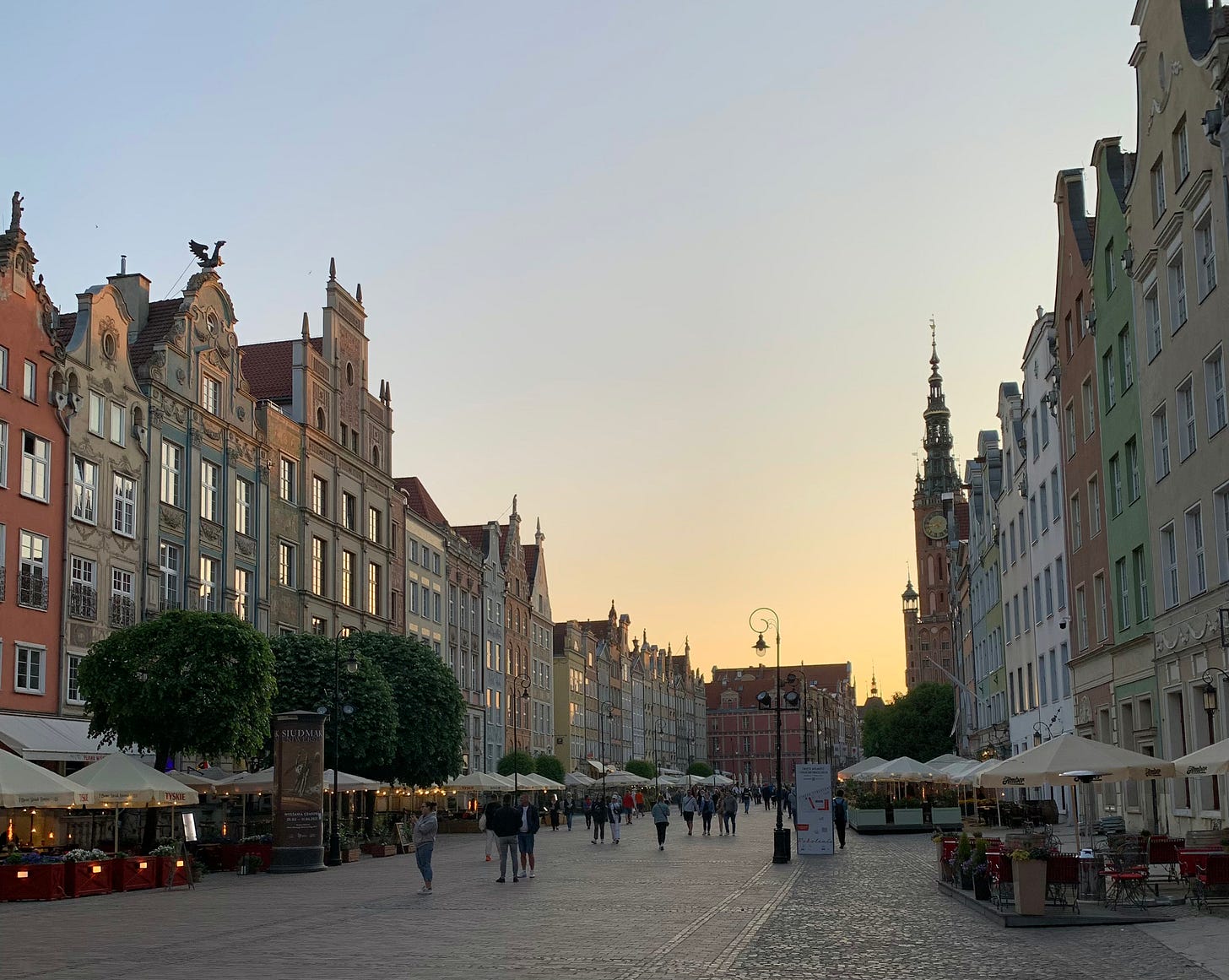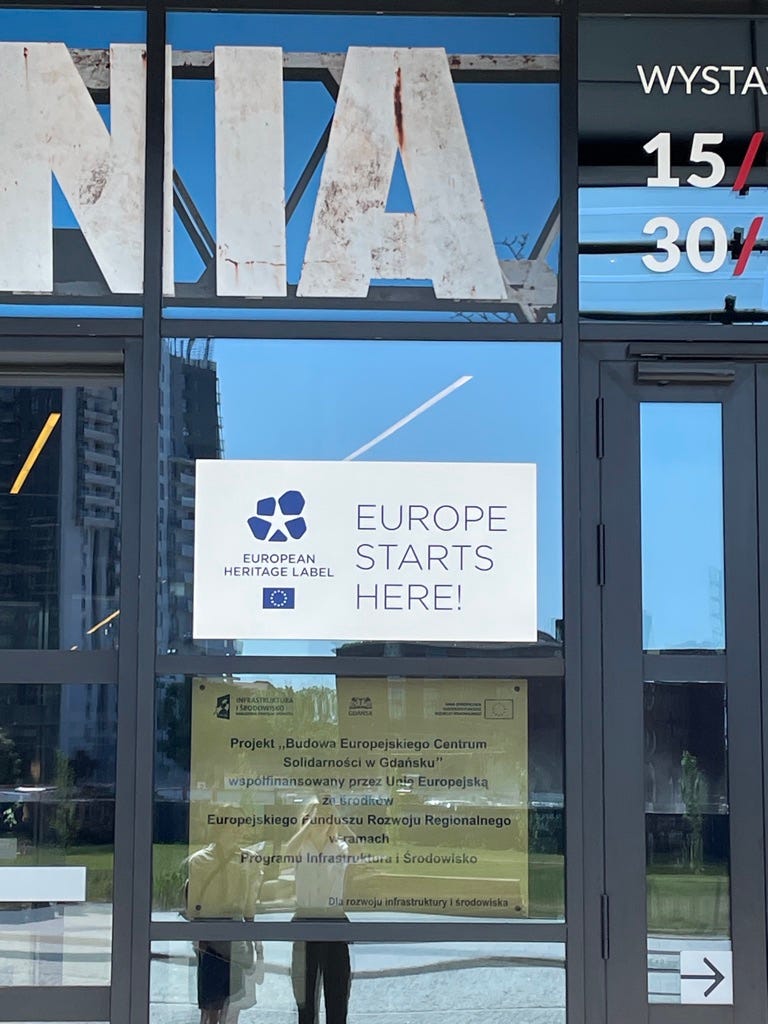Field Notes from the Baltics
A reflection on Eastern Bloc public history, memory culture, and beetroot soup from Poland, Lithuania, and Latvia
Hi all—as many of you know, I’m currently a fellow at the Creative Impact Research Centre Europe working on a project about geography and identity. I left Berlin a week ago, and this will be the first of several blog posts from my travels. This essay (around 4,500 words) feels very close to my heart, and I wish I could make every essay absolutely free, but writing is now my full-time job.
There is a small, yellow bug crawling on the corner of my book. The insect is no bigger than half a grain of rice, triangular, and his antennae investigate the air with a charming curiosity. I think to myself that I ought to write this down— his ochre color stands so starkly against the Prussian blue of the psychiatrist's waiting room floor—but I decide to keep reading instead; if the image is potent enough to deserve inscription, it’ll come back to me later. The book is Walter Benjamin’s One Way Street, and I’m reading the titular essay, written in 1928. A spare Uno card keeps my place in the book and I’ve taken a pen to the margins to make unorganized annotations, usually just stars and exclamation points.
Benjamin grew up in Magdeburger Platz, a short walk from where I’m sitting, by a now-defunct market. His father, an Ashkenazi antiques dealer and banker, owned stock in the city’s zoo, and as a child Benjamin would frequently visit the otters. My yellow creature waddles on the margins of page 69, above a line which reads “Keep your pen aloof from inspiration, which it will then attract with magnetic power. The more circumspectly you delay writing down an idea, the more maturely developed it will be on surrendering itself. Speech conquers thought, but writing commands it.” The psychiatrist calls my name, and I close the book to follow him to his office.
We leave for Gdańsk on a Sunday morning after pastries and goodbye kisses left on the cat’s tawny forehead. I am ripe with anxiety; there’s an issue with our train tickets. Someone working at the station tells us it’s fine, but when the conductor comes he insists we’ll need to disembark in Poznan and find new tickets. Charles and I play three games of Uno and I lose each one. I don’t know how I can keep losing—it’s a children’s game, and I’m cheating. Defeated and high-strung, I open my book to read. On page seventy-five, I find a small, yellow, six-legged carcass crushed into page 75. When the creature’s body falls out, it leaves behind a stain. I want to cry. I can’t. Instead I skip dinner, and in his honor, I let the warm and carnal sensation of hunger remind me of this insect’s life and my own thoughtlessness.
Benjamin died in 1940, choosing to overdose on morphine tablets rather than risk capture by Nazis in Catalonia. As we take the train from Germany into Poland, I am suddenly paralyzed by history, by memory, by feeling. Standing still in Berlin feels fine. Feeling the gentle rocking of the train, almost like a cradle, my feet feel like they are made of lead. Are these the same rails that carried the Jewish people of Berlin, the ones with the same crooked smiles and freckled noses as the people I know and love today, to their murder? Did the landscape look the same, at least for the ones lucky enough to see beyond tightly packed bodies and a dense cloud of fear? Were these aspens and the pines—which to me resemble the beautiful and lithe and postured women of Manhattan and California—the same ones seen by the heartbroken prisoners of the Nazi regime? Did their emaciated trunks stab at the skyline, a puncturing harbinger of the starvation and disease that was to come for these passengers? Charles says no, that the Nazi rail, the Breitspurbahn, was a failure and the tracks couldn’t possibly be the same. But the trees could be.
When we cross into Poland, a new conductor boards the train. We try to explain our lack of seat reservations to the young woman who is now taking tickets; she shrugs and tells us it’s fine before we can finish. Charles asks if I want to play more Uno. I decline.
Gdańsk is beautiful and affordable, and on our first night we eat cold beetroot soup at a hipster vegan cafe that has Courtney Barnett playing on the speakers and colored pencils in a bowl on the table. I draw the cows we saw from the train in my little red notebook.
Over breakfast the next morning, while discussing which museum we should visit, Charles and I try to name famous Polish-Americans. There’s Casimir Pulaski, like the Sufjan Stevens song, and Tadeusz Kościuszko, whose namesake bridge in Albany has almost resulted in more than one car accident as I try to sound out the pronunciation while driving. There’s Leon Czolgosz, the anarchist that assassinated William McKinley, and we joke that he was probably mostly trying to impress Emma Goldman, and conclude that she was certainly a woman worth courting. As our discussion shifts to presidential assassins, we realize we have somehow forgotten the name of the man who shot John F. Kennedy, but we both remember the name of the man who shot the man who shot John F. Kennedy. Jack Ruby—a midwestern nightclub owner with an eight-letter name, a Colt Cobra revolver, and a dachshund named Sheba—is there anything more American? Later, we learn that Jack Ruby was born to Orthodox Jewish, Polish-born parents. I don’t think that means much.
Most of what I know about Poland after the second world war, I learned in a college course on the Cold War. It was probably the only “traditional” history class I took, names, dates, treaties, battles, and alliances to memorize, and I did poorly in the class compared to the courses where we read Hegel and Foucault and talked in circles about historiography and subjectivism and narratives. When we arrived in Gdańsk, I knew little more than that Poland was one of the first countries to leave the Eastern Bloc, its population mobilized by the Solidarność industrial union and the Catholic church under the guidance of Pope John Paul II, the first and only Polish Pope.
“EUROPE STARTS HERE!” reads the sign on the front of the European Solidarity Centre, a museum and library dedicated to the history of Solidarność, which was born out of the shipyard then known as the Vladimir Lenin Shipyard in Gdańsk and led by industrial electrician and eventual Polish president Lech Wałęsa. A sign in the atrium informs us that we have entered the “Cradle of European Freedom.”





